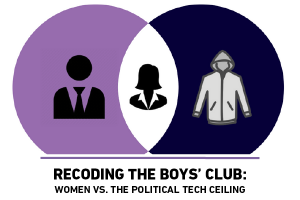Recoding the Boys’ Club: Women vs. the Political Tech Ceiling
by Barbara Wiedemann
On a muggy May 10 afternoon in a well-outfitted Google DC auditorium high above Massachusetts Avenue NW in Washington, D.C., 11 undergraduates and one recent graduate — all from UNC-Chapel Hill — broke new ground when they presented “Recoding the Boys’ Club: Women vs. the Political Tech Ceiling,” the first-ever in-depth look at women’s experiences working in political technology at the presidential campaign level.
The datamining dozen, seven of whom graduated a scant three days after the launch event, unveiled a fissure in gender equity at the intersection of technology and politics: according to their analysis, only 32 percent of staffers working in digital media, tech and data analytics on presidential campaigns from 2004–16 were women. Both sides of the aisle reflected a gender gap: 65 percent of Democratic staffers and 76 percent of Republican staffers were men. In that same period, for every woman in a director's role or higher, there were three men who had held the same position. Entrepreneurship was also affected: of the 119 staffers in the data set who founded firms and organizations between 2004–16, 94 were men compared to only 25 women.
Only 32% of all staffers on presidential campaigns from 2004-2016 have been women --> https://t.co/TphnJGU9o4
— Alexi McCammond (@alexi) May 11, 2018
The data was simultaneously unveiled on a polished website and in a readable 80-page report, which was shared by Axios reporter Alexi McCammond the next morning and noted in Poynter’s “what we are reading” list. The website, report, presentation materials, event planning and communications strategy were all produced by the team of Carolina researchers. Hussman School undergraduates Jenni Ciesielski ’19, Kate Frauenfelder ’18, Brinley Lowe ’19, Meredith Martinez ’18, Haley McDougal ’18, Gabrielle Micchia ’19, Samantha Paisley ’18, Sumner Park ’18, Abbey Rogers ’18 and Jordan Townsend ’18, and recent December graduate Emma Harrison ’17 worked alongside College of Arts and Sciences undergraduate Meredith Randolph ’18 to gather, interpret and draw conclusions from the data; and to present their material across multiple channels.
Hussman School Associate Professor Daniel Kreiss and two graduate students guided the Women in Political Technology research class as they analyzed a database of nearly one thousand presidential campaign staffers in the 2004, 2008, 2012 and 2016 election cycles; and as they interviewed 45 women from 12 different Democratic and Republican campaigns over the same time period.
Kreiss and Hussman School Roy H. Park Fellows Kirsten Adams (Ph.D. student) and Holly Roberts (M.A. student) accompanied the researchers to D.C., where the team presented their findings before a rapt audience of more than 100 invited communications and technology professionals and Washington insiders.
The Carolina research team presented their quantitative data and followed with insights gleaned from the qualitative data they’d gathered, sharing quotes from their interviews with 45 political technology campaign professionals. Given the potentially sensitive nature of the interviews, and the likelihood that participants would address themes that affected future employment, all interview participants were granted confidentiality and information was reported using only general descriptors of roles on presidential campaigns.
The Carolina team used their quantitative and qualitative data to draw conclusions about why women are underrepresented in political tech; why women who work in political tech may not be heard; and the challenges of accountability. The study’s recommendations suggested that gender disparities might be tackled over time with more deliberate hiring and promotion by campaigns; with a more inclusive environment via mentorships and strong networks; and by making a commitment to strengthening accountability in order to fight discrimination and the resulting loss of talent.
The team’s presentation was followed later in the afternoon by a frank and often empowering panel discussion led by undergraduate students Lowe and Martinez, who talked with seasoned political technology professionals Carol Davidsen of comScore; Erin Gaetz of Southpaw Content; Betsy Hoover of Higher Ground Labs and 270 Strategies; Clarke Humphrey of Bully Pulpit Interactive; and Samantha Osborne Reynolds of Advoc8.
The May 10 Google DC presentation was made possible by event sponsors Facebook, Microsoft and WPAi, with special thanks to Katie Harbath (Facebook), Ginny Badanes (Microsoft) and Chris Wilson (WPAi) for their support of the school and its students over the years.
Twitter users can join the conversation at #ProjectRecode.
